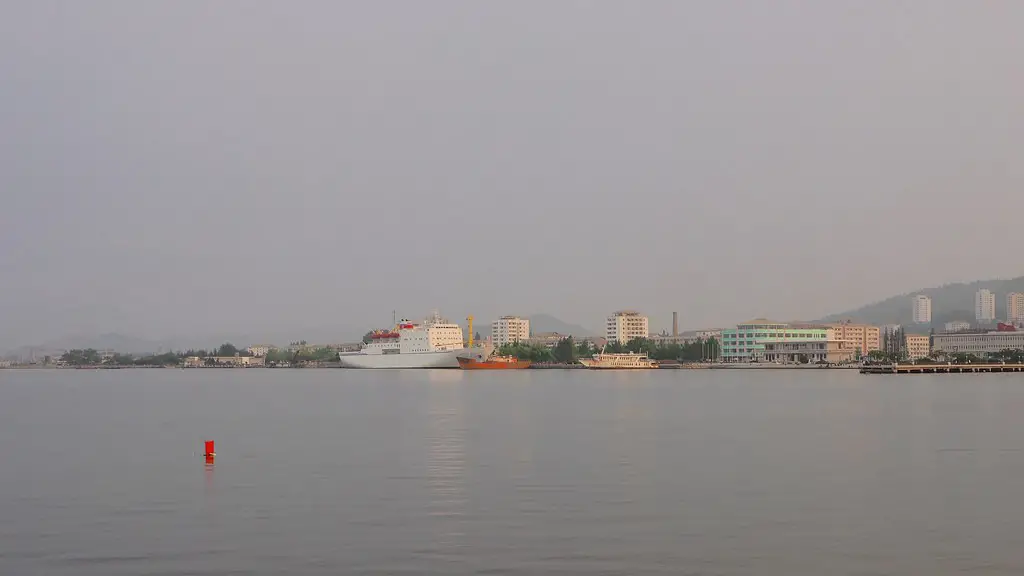Power Structure
North Korea is an isolated hermit state, whose leader wields absolute power over the nation’s government, society, and the lives of its citizens. The power structure in North Korea is highly centralized and few state decisions are left to be made by the people themselves. The power in North Korea is largely concentrated in the hands of the supreme leader and his cronies. Kim Jong Un is currently the leader of North Korea and has been since 2011. It is Kim Jong Un who makes the decisions on policy and controls the state organs. He is known as the Supreme Leader and is seen as a figurehead in North Korea.
In North Korea, Kim Jong Un’s power is greatly emphasized and his decisions are followed without question. The North Korean government also plays a role in decision making and is headed by the Central Committee of the Workers’ Party of Korea. This committee is made up of loyal advisers and is composed of members selected by the Supreme Leader. The Central Committee of the Workers’ Party of Korea is responsible for the implementation of policy and the observation of carried out decisions.
Military Power
The North Korean military is an important factor within the decision making process in North Korea. North Korea has one of the largest armed forces in the world, with over 1 million active duty personnel. The military serves to defend the nation, as well as to perpetuate the regime’s ideology throughout society. It plays an influential role in the running of North Korea, with the army chiefs being consulted in decision making processes.
The military is largely loyal to the Supreme Leader and is seen as a key to the regime’s surviving power. This has led to the military having an active role in decision making. The military also serves to uphold the goals of the state, and thus of the Supreme Leader. This has reinforced the military’s influence in decisions made at the governmental level.
The Role of the People
The citizens of North Korea play no major role in decision making. The citizens are expected to follow the decisions and policies passed down from the government and the Supreme Leader. North Korean citizens have no formal role in the decision making process and must abide by the decisions and policies outlined by the government. North Koreans are taught from a young age that the Supreme Leader is infallible, and that his word is law, this reinforces the idea that citizens have no real authority to challenge or criticize the decisions made by the leadership.
Sanctions
International sanctions and global pressure are another influence on decision making in North Korea. International sanctions have been placed on North Korea due to nuclear testing and the stockpiling of nuclear weapons. These sanctions have led to a decline in the economy and the implementation of harsher laws, such as restrictions on trade. Sanctions have also hampered the ability of the leadership to develop the country and have had far reaching implications for decision making in North Korea.
The Effect of China
China is one of the key external influences in North Korea and has been since the Korean War. North Korea relies on China for diplomatic support, economic aid and trade. China is a powerful ally and has been able to affect decision making in North Korea, as well as influencing policy. China has been able to leverage their influence to manipulate decision making in North Korea and has often used this influence to support their own agenda.
Propaganda and Censorship
Propaganda and censorship are key tools used by the North Korean regime to control the population. The state releases propaganda often in order to influence the general population, while censorship is used to stifle dissenting views. Propaganda and censorship combined have been greatly influential in decision making as they help shape how the citizens view and react to the policies of the regime.
Political Purges
Political purges have been a long standing practice in North Korea, and are used to control decision making by removing any potential threats to the regime. Political purges are used to weed out potential rivals and any dissenters, and to consolidate the power of the supreme leader. Political purges have been effective in removing any potential rivals and keeping the population submissive and controlled.
Government Agencies
Government agencies and bureaucracies also play a role in decision making in North Korea. There are various government agencies, including the Ministry of People’s Security which is responsible for law enforcement and internal security, the Ministry of Social Security, the Korean Workers Party, and the Control Institution. These government agencies are responsible for implementing policy and ensuring it is upheld. They are largely obedient to the Supreme Leader and are involved in decision making processes.
The Role of Ideology
Ideology has played an instrumental role in decision making in North Korea. The state follows a policy known as “Juche” or self-reliance, which is heavily emphasized by the regime. Juche is seen as the basis for all decisions made in North Korea and has had a major influence on policy. The regime also promotes the concept of “nationalism”, or loyalty to the regime, which is heavily enforced and has had a major role in decision making.
The Influence of Foreign Countries
Foreign countries have had some influence on decision making in North Korea. Nations such as the United States, South Korea, and Japan have attempted to use diplomatic and economic pressure to influence the regime. However, this influence is limited due to the regime’s isolated and secretive nature. Moreover, the regime is largely resistant to outside interference in decision making, and tends to ignore attempts at influencing policy.
International Pressure
The international community has put increasing pressure on North Korea to abandon its nuclear weapons program, and to implement human rights reforms. This pressure has increased the risk of armed conflict between North Korea and the region, as well as the risk of a nuclear weapons escalation. This pressure has had a direct effect on decision making in North Korea, as the international community has been able to use sanctions and isolation to force change.
Summary
In North Korea, decision making is largely centralized and controlled by the Supreme Leader and his cronies. The military holds a powerful role, while citizens are expected to abide by decisions passed down from the government. International pressure, economic sanctions, and ideological promotion all play a part in the decision making process, while foreign countries and the international community have been attempting to influence the regime. Ultimately, however, it is the Supreme Leader who makes the final decisions in North Korea.



